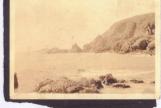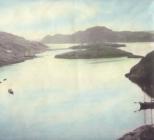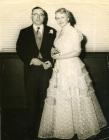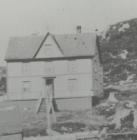67
During the Tidal Wave, Emmanuel Inkpen and his wife, both sick at the time, were swept away from land in their houses. Stella's brother, Chesley Foote, a cripple with an artificial leg, being the only man nearby, forgetting his own safety, took a broken and leaky dory and rescued the Inkpens from certain death by getting them out of the house through a window.69
"What One Woman Remembers" Part IStella Foote, born 1890 at Stepaside, resided in Shalloway with her husband, Oliver Inkpen. She vividly remembered November 18th, 1929. The first tremor occurred, around four in the afternoon. She thought the rocky mountain behind her home was experiencing a landslide. Running out with her two month old baby in her arms she was met by her two other children and a nephew amazed at the motion of the ground beneath their feet. When the tremor appeared to have passed, Oliver and his brother walked to great Burin by way of connecting bridges. They were barely able to reach safety in Great Burin when a tidal wave struck. It was getting dark and by the light of an oil lamp, Stella was ironing baby clothes, when she heard an awful swishing soulnd, and looking out the window, saw the boiling white water sweep away the bridges. She thought her husband was drowned. She gathered the children together and Uncle Tom Moulton and another man urged her to hurry to higher ground. One of them took the baby in her cradle and one took four-year old Hazel and they all went up the hill to Stella's mother-in-law's house. they had just left the beach when the second wave struck. It was worse than the first becasue it swept away many houses and stages which were in its path.
71
Part II: "What One Woman Remembers "After the second wave struck, Oliver and his brother tried to return to Shalloway by using a small boat which was sometimes used as a ferry and started out. They met the third wave which tossed the boat around but they finally reached their stage which was miraculously still there. When Stella had left the house to run to higher grounds, Stella had blown out the lamp, thus leading Oliver to believe that the house was gone in the wave. Yet, it too was miraculously still there. Around two o'clock in the night at the harbour area, the water was invisible: covered by a solid bridge comprised of floating wharves, stores, warehouses, flakes, boats and debris. By daylight they were amazed to see floating barrels of pork, beef, molasses and eveything imaginable that had been let loose from the stores and business firms.73
P.J. Antle's StoryThe 18th of November, 1929 was a beautiful cool, sunny day. I was nineteen years old at the time, and every last detail of that terrible night stands out vividly in my memory, never to be forgotten.The fishing communities on the Burin Peninsula were a bee-hive of industry taht day; men were engaged in the usual variety of tasks, landing and storing fuel and food supplies, and securing small boats for winter. As the only means of transportation was by sea, the custom was to lay in supplies of food in the fall sufficient to last until spring. Women called to each other from gardens where the last vegetable were taken and stored. Children returning from school romped and played, and plucked bunches of bright red dog-berries from trees along the road.
75
The scenic beauty of the place could be described in two words "gentle tranquility." Little did they know that death and destruction lay poised to strike and, like some savage beast of the jungle, waited for the darkness that would add to the terror of its attack.77
Mr. & Mrs. Pat Antle (author)The Earth Trembled
The first shock was felt at five o'clock in the evening. I was returning from a hsopping errand when I heard the first rumbling noise. It sounded like an airplane int he distance. In a few seconds the earth began to tremble violently as the noise increased to a deafening roar. People spilled from houses nearby. With hardly a single exception everyone looked towards their roofs; I learned later that householders were convinced that hte noise and shaking was the result of a chimney fire or explosion. The shock passed as suddenly as it had come, leaving hte poeple ina tstate of wonderment. Little groups gathered here and there and discussed the thing that had invaded the peaceful serenity. All sorts of ideas were xpressed some bordering ont he fantastic. What seemed to be the most logical explanation was expressed by a man who had been in Halifax at the time of the Mount Blanch explosion. He suggested that it might have been an explosion of a ship at Burin, seven miles distant, carrying a load of oil or other explosives.
79
Photo: Bert Winter's house, Burin, Newfoundland.Meanwhile, darkness settled. As was the custom, people gathered in each others houses to play cards, or discuss the day's events. At the home of a friend a group of eight had commenced a game of auction fory fives, Newfoundland's most popular card game. Suddenly, from outside, someone shouted that the place was sinking; there was a scramble for the door. As we reached the outside we saw the first giant wave sweeping in over the land. Like a great black monster it came, tearing in, sweeping everything before it. I judged it to be about thirty feet high. Words fail to descibe the chaos of the next minutes. Pnademonium, such as we had never before witness broke loose. The wave tore boats from their anchorage, ripped buildings from their foundations, and flooded the floors of houses great distances inland. The noise of smashing timber, the roar of the sea, the movemnt of thousands of tons of rocks and beach gravel, the screams of horrified people, all blended into one indescribable crescendo. It seemed as if all the demons in Hell were let loose.
80
Complete Chaos19 November 1929
Port au Bras, Dominion of Newfoundland
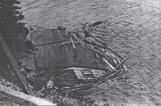 Credits:
Credits:Photo Courtesy Provincial Archives

